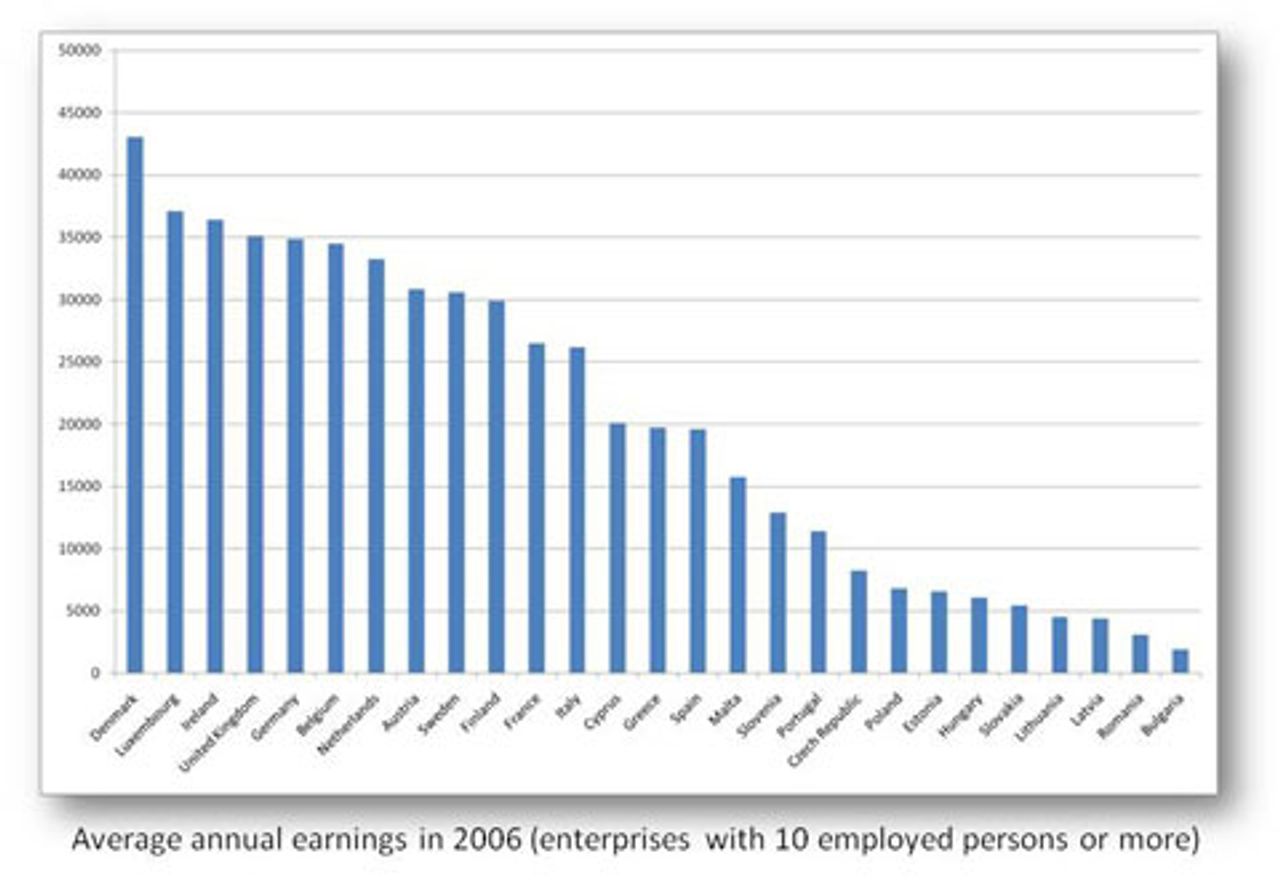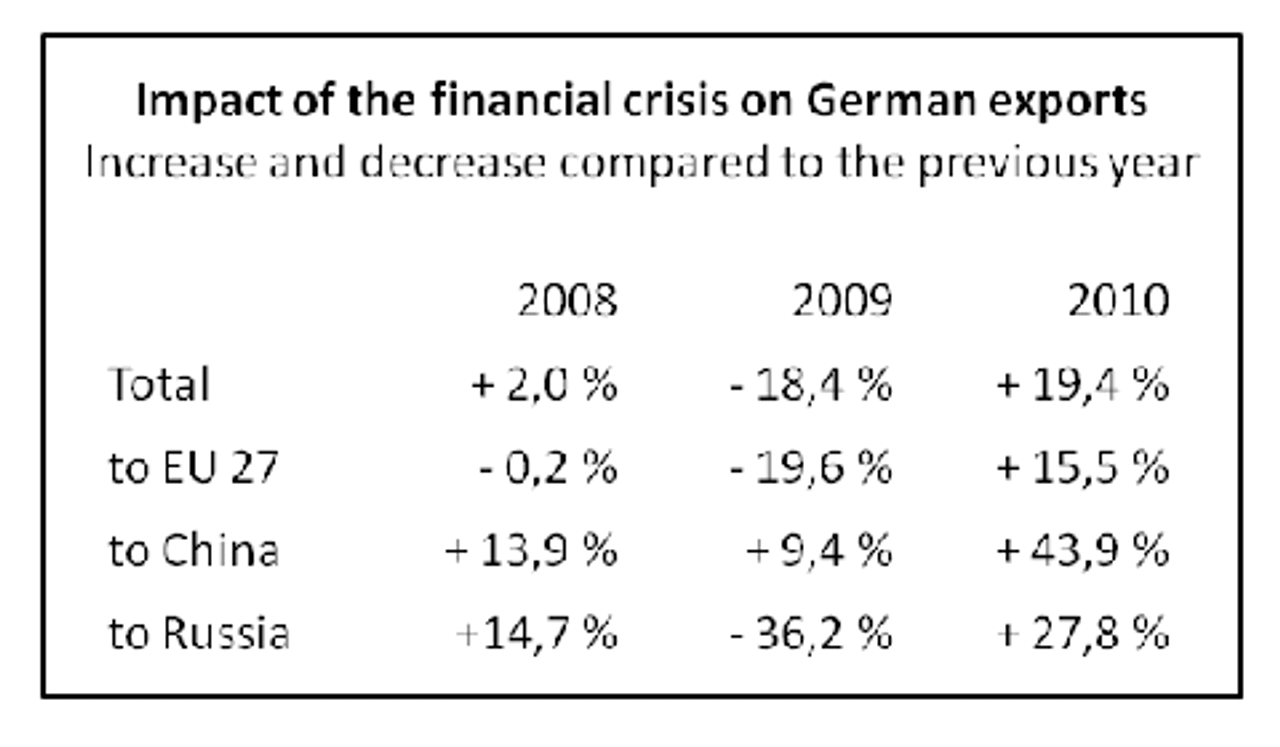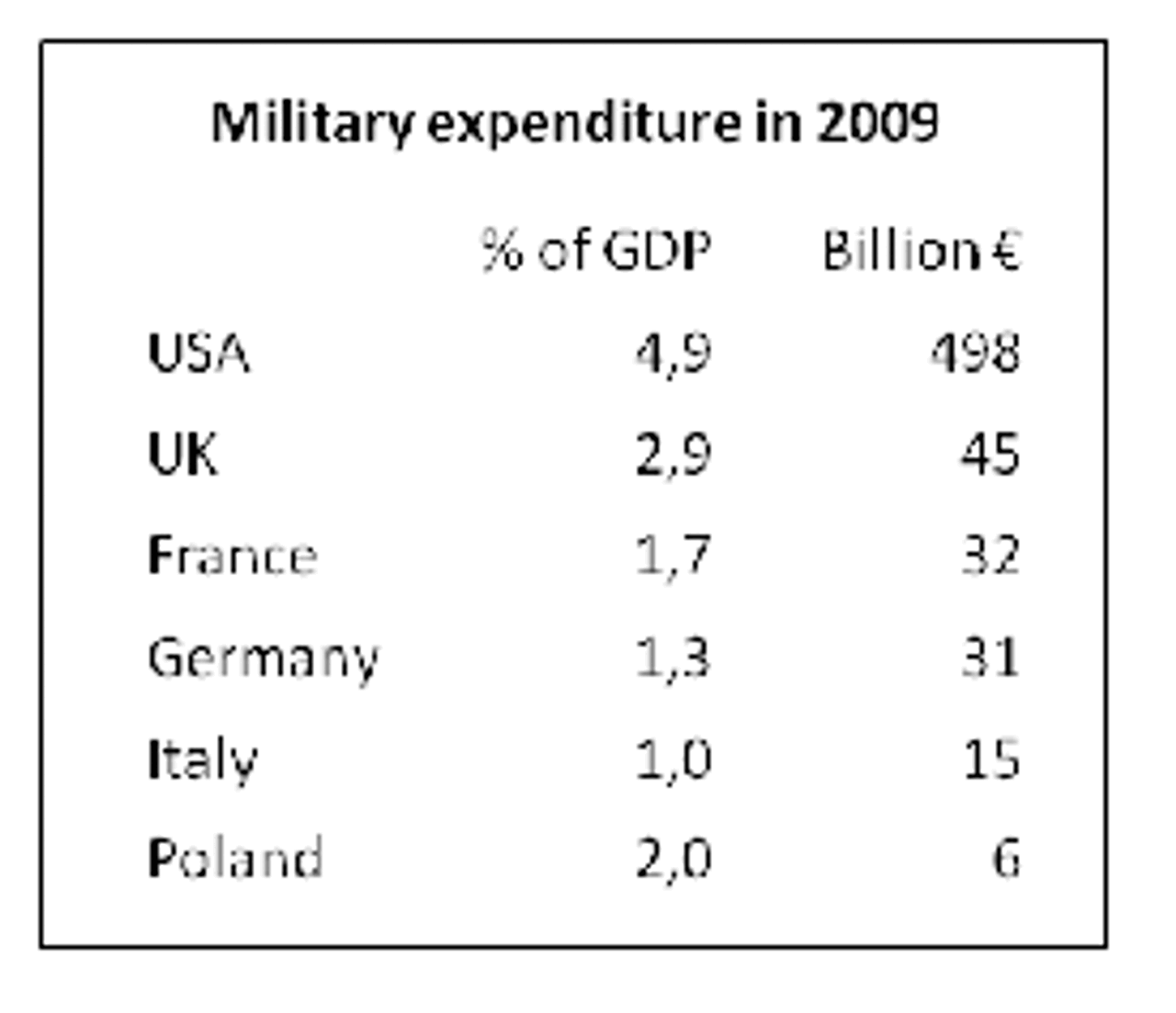The following article is based on a report given by Peter Schwarz, secretary of the International Committee of the Fourth International, at a seminar of the German section of the Socialist Equality Party during the Easter holidays in 2011. Part 1 was published on May 30, 2011. Part 2 was published on May 31, 2011.
Consequences of the international financial crisis
All the figures given up to now refer to the period before the outbreak of the international financial crisis in 2008. This crisis is a historical turning point. All of the economic contradictions that had gathered below the surface were forced into the open resulting in major political and social shocks with revolutionary implications. As in the periods before the First World War and the Second World War, the growth of inter-imperialist conflicts is accompanied by an onslaught against the working class.
Even prior to the crisis, working class living standards had been stagnant and social security systems had been systematically dismantled. In Eastern Europe, the restoration of capitalism has had catastrophic consequences. Nothing remains of the relatively efficient education and healthcare systems. Although the price levels adjusted themselves quickly to those of Western Europe, workers and employees in some cases earn only a tenth of the wages paid in the West.
The following statistic shows the average annual income of a full-time employee in a company with ten or more employees in 2006. Salaries range from between €43,000 in Denmark and €1,900 in Bulgaria. So, a Bulgarian worker earns twenty times less than his Danish colleague. Greece and Spain are somewhere in between, with €20,000. This is less than half a Danish wage, but still ten times more than a Bulgarian wage.

Following the international financial crisis, the attacks on workers’ living standards are taking devastating forms. The trillions in funds that were given to the banks to cover their speculative losses are being recovered at the expense of the working class. This process starts at the fringes of Europe and proceeds to the centre.
Hungary, Romania, Greece, Ireland and Portugal are already subject to IMF austerity measures, which are lowering the population’s standards of living by 20 to 30 percent, sending prices sky-high due to increases of value-added taxes, and decimating the public sector with job reductions and financial cuts. Life is becoming literally unbearable in these already poor countries.
In Greece, Papandreou’s government has just announced another austerity program after the first two already lowered the population’s living standards by 30 percent. Portugal has to realize a similar austerity program after asking the EU and IMF for financial support.
In the UK, Cameron’s government has passed an austerity program that will decimate the public health system, free education and other achievements of the British working class.
In Germany and France, social attacks are currently concentrated on increasing the pension age, further increased flexibility of the labour market, growing pressure on welfare recipients and expansion of low-wage labour. But this will not be the end.
In 1923, Leon Trotsky described Europe as a madhouse being torn apart, fractured, exhausted, disorganized and balkanized. Today, these tendencies are once again becoming dominant. The days when Germany’s export economy benefited from the euro, while poorer countries obtained access to cheap loans and at least created the impression of economic wealth, are over. The ruling class is turning its back on their project of a unified Europe and is aggressively pursuing national interests. The costs of the economic decline and growing militarization resulting from this development are being imposed on the working class.
Within the ruling elites of Germany and other Northern European countries, an increasing number of voices claim that the euro is too expensive and the single currency should be abolished, the sooner the better. The view that the single currency ought to be confined to a small number of Northern European countries—hitherto the standpoint of a few fringe individuals such as Hans-Olaf Henkel, in his book Save Our Money—is gaining support. Populist right-wing parties such as the True Finns or the National Front in France, who are agitating against both the EU and the euro, are gaining momentum with the support of the media. In Germany, right-wing populists such as Henkel and Thilo Sarrazin have been given a public platform on numerous talk shows.
Major conflicts are developing between Germany and France over the form of the European Financial Stabilization Mechanism. While Germany favours a debt restructuring exercise, which could cut Greece off from private credit and lead to a collapse of its banking sector, France vehemently rejects such a path, fearing to be affected itself.
The renunciation of the euro is accompanied by a re-orientation of economic and foreign policies. There is no comprehensive data available up to now, but some tendencies are apparent.
In 2009, German exports decreased by 19 percent as a consequence of the economic crisis. In 2010, it recovered these losses and almost achieved the record figures of 2008. But while exports into the Eurozone rose by only 14 percent and remained less than they were before the crisis, German exports to China increased by 44 percent, and those to Russia by 28 percent.

Germany is also broadening the arena for its Foreign Direct Investment beyond Europe. This is one of the reasons for the disputes over the war against Libya. This war is being fought mainly for oil, but also for export markets, capital export and the suppression of the revolutions in the entire Arab region. The return by France, Britain and Italy to an aggressive colonial policy must be seen in this context. In view of the crisis within the European Union, they are reverting to the traditional methods that in the past gave them the upper hand over their German rival.

In military matters, Britain and France are still superior. Germany spends only 1.3 percent of its GDP for military expenditures. France spends 1.6 percent and Britain 2.8 percent, more than twice as much. Both countries, however, are dwarfed by the US, which spends almost 5 percent of its GDP for military expenditures.
As was the case in 1890, when Germany felt “isolated” on all sides, it will search for other means and ways to defend its interests. A re-orientation of foreign policy is just as inevitable as an increased role of the German army. Both aims, however, cannot proceed without inner conflicts and crises.
The political crisis in Europe
The changes in Europe have led to a deep crisis within all bourgeois parties. As the middle classes drift apart, the social basis for the so-called “peoples parties” is disintegrating, and the re-orientation of foreign and economic policy is inevitably causing political tensions. The conservative governments of France, Germany and Italy are all in deep crisis. If elections were imminent it is unlikely that they could retain power.
Until now, the ruling classes were able to master this crisis because the working class has neither an independent leadership nor a political perspective. Since the mid-1990s, they have relied mainly on social democratic parties and the trade unions to secure their rule – on Tony Blair’s New Labour in the UK, Schröder’s and Fischer’s coalition of the SPD and Green Party in Germany, Jospin’s administration in France and Prodi’s in Italy. As a result of this process, the social democrats have discredited themselves and not recovered again.
Since then the bourgeoisie has increasingly turned to former leftist, petty-bourgeois forces to keep the working class under control and prevent an independent revolutionary movement. The French Pabloites, who were able to benefit from the Socialist Party’s decline and achieve significant success in elections, are playing a key role in this respect. They reacted to their “success” by breaking off any formal connection to Trotskyism and founding the New Anticapitalist Party (NPA), which functions ever more openly as a bourgeois, pro-imperialist party. The NPA played a vital role in suppressing the strike movement against Sarkozy and is currently justifying the NATO war against Libya.
In Germany, a similar role is played by the Left Party, founded by social democrats, union officials and ex-Stalinists to stop the decline of social democracy. It has drawn all the petty-bourgeois radicals into its ranks.
In the meantime, the putrefaction of bourgeois politics has reached a point at which right-wing and fascist movements can thrive. In France polls award the National Front more support than Sarkozy’s UMP. In Finland, the True Finns gained one fifth of the votes in the latest elections. In Hungary, the ruling Fidesz is reviving the authoritarian traditions of the Horthy regime. In Italy, Austria, Denmark, the Netherlands and Switzerland, right-wing populist parties are also playing an important role.
They owe their success to the fact that the bourgeois “left” and “far-left” have shifted far to the right and have permitted the ultra-right to manipulate the growing wave of social protest. Marine Le Pen, for example, who took over the leadership of Front National from her father Jean-Marie Le Pen in January, has shifted its focus to social matters and – according to some polls – has won the support of sections of workers.
At the same time, the ultra-right receives significant support from the media and traditional bourgeois parties. They pave the way for such movements by adopting their anti-foreigner program or via direct collaboration. In France Islamophobia and xenophobia are official government policy; decisions such as the ban on headscarves at schools and the burqa are supported in turn by so-called “leftists.” A faction of the ruling UMP advocates electoral alliances with the National Front.
For the working class, this support of far-rightists must be a warning. The bourgeoisie’s willingness to use fascist methods to suppress the working class is growing.
In Germany there have also been deliberate campaigns aimed at nurturing xenophobia and racism. One example is the broad platform provided by the media for Thilo Sarrazin to spout his racist filth. Sarrazin’s main source of support came from a wealthy section of the middle class. But presently another political development predominates: the rise of the Green Party.
The political roots of the Greens lie in the protest movement of the late sixties and seventies. In this respect there are parallels with French ex-lefts, although the Greens had already made the turn into an openly imperialist party in the late 1990s. As a governing party at the time, they played a decisive role in reviving German militarism and enforcing the Agenda 2010, supporting the social democratic chancellor Gerhard Schröder against opposition from inside his own party. Now, under conditions of a general crisis of all other bourgeois parties, they are needed to mobilize petty-bourgeois layers against the working class. This is the content of their program, which combines bits and pieces from ecology, identity and alternative politics with strict fiscal austerity.
Tasks of the PSG
The advanced nature of the crisis in Europe confronts the Socialist Equality Party (Partei für soziale Gleichheit, PSG) and its European co-thinkers with major political challenges. It is hard to predict exactly how the next stage of the crisis will develop. What can be said, however, is that this crisis will deepen and last for a protracted period of time.
The working class will not accept the attacks on their social and democratic rights without resistance, even if their old organizations have stabbed them in the back. We have seen a significant growth of protest and workers’ struggles in recent months. The revolutions in Tunisia and Egypt as well as the reawakening of the class struggle in the US are of international significance.
The responsibility for giving leadership and perspective to these struggles lies upon the International Committee of the Fourth International, and its German section, the PSG. Our work during the last 25 years has prepared us for this task.
In 1985-86, we broke with the renegades of the British Workers Revolutionary Party, which shifted away from internationalism and turned towards Stalinism, the trade union bureaucracy and petty-bourgeois nationalism. Without this split, we would today be in the camp of the Left Party. Since that time we have developed and elaborated our views on the unions and national liberation movements, founded the PSG and established the World Socialist Web Site.
Our struggles against the Left Party, the French NPA and our polemics against attempts to smuggle the ideology of the Frankfurt School into our movement have also prepared us politically and ideologically for the current situation. The successful conferences held recently by the Socialist Equality Party in the United States under the motto “The Fight for Socialism Today”, highlighted that our program is finding a growing resonance among the working class.
The building of the International Committee of the Fourth International in Europe calls for a permanent political and ideological struggle against pseudo-leftist and petty bourgeois parties, such as the Greens, as well as a systematic offensive in the working class. These two tasks are inseparably connected with each other.
Our participation in the Berlin state election in September will play a vital role in this regard. In many respects all of Europe’s social and political questions find a concentrated expression in Berlin. The city is characterised by unemployment and low-wage labour. In the bourgeois camp, the Greens are facing a coalition of the social democrats and the Left Party, supported by petty bourgeois ex-leftists. The CDU and the FDP barely play any significant role.
Our campaign will concentrate on winning new members for a systematic political and ideological struggle against both camps, and to train them politically.
We will lead this campaign on the basis of a European and international perspective. The perspective of the United Socialist States of Europe plays a vital role in fighting against the adherents of the EU as well as its ultra-right enemies. From the working class’s point of view the economic union of Europe is mandatory. But this task cannot be left to the bourgeoisie and its European institutions, whose policies are deepening the divisions and conflicts in Europe. It is connected inseparably with the working class’s conquest of political power and the realization of a socialist program.
In 1926, Leon Trotsky declared in his speech “Europe and America”: “No matter where the revolution may first break out, and no matter what the tempo of its development may be, the economic unification of Europe is the first indispensable condition for its socialist reconstruction. Back in 1923 the Communist International proclaimed that it is necessary to drive out those who have partitioned Europe, take power in partitioned Europe in order to unify it, in order to create the Socialist United States of Europe.”
